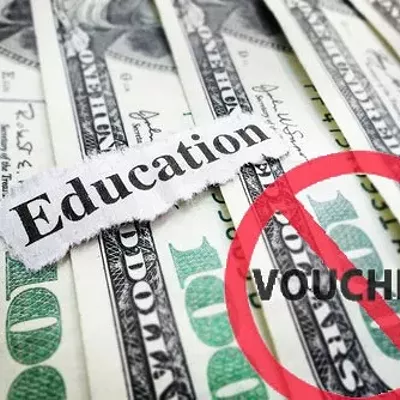Wednesday, July 29, 2015
AZ Republic Targets Tuition Tax Credits
The AZ Republic recently published at least six articles and columns about Arizona's Tuition Tax Credit program, and there may be more coming. Reporter Alia Beard Rau deserves credit for being at the forefront of the Republic's work on the issue. For anyone who wants to dig deeper into the issue, I link to the Republic pieces at the end of the post.
Tuition tax credits are sometimes referred to, accurately, as backdoor vouchers. An Arizona taxpayer "contributes" money to one of the state's private School Tuition Organizations which give out private school scholarships, then the taxpayer gets 100 percent of the "contribution" back in the form of a credit on income taxes. "Contribute" $1,000, pay $1,000 less in state taxes. The result is, the taxpayer foots the bill. It's a private school voucher program by another name. Like the more recent Education Savings Accounts, aka Empowerment Scholarship Accounts, aka Vouchers on Steroids, tuition tax credits are carefully crafted to get around the state constitution's prohibition against using state funds for religious education. If, unlike me, you like private school vouchers, you probably like the programs. If you think the tax credits are a good idea because they help poor kids go to private schools, well, they help rich kids go to private schools too. These programs continue to grow, with the goal, stated by many Republican legislators, of offering vouchers to every student in the state.
The longest and most comprehensive piece in the Republic is Arizona private-school families cash in on state's tax-credit program, which includes a great interactive map that shows every Arizona private school that receives the tax credit money and how much they get. The others focus on specific issues.
I could go on almost endlessly about tuition tax credits as I have in the past, mainly on Blog for Arizona when the topic was first spotlighted in 2009. I won't, especially since the Republic has done a good job exploring the topic. Instead, I'll focus on a few issues I think are especially interesting.
Enrollment in Arizona's private schools dropped since the Tuition Tax Credit program began in 1997 according to Alia Beard Rau.
Arizona’s private-school enrollment in 2012, the most recent year available, was nearly 2,000 students lower than it had been since before the tax-credit program was started. Public and charter schools in Arizona during that same period have grown by more than 400,000 children.Put that enrollment drop next to the $140 million spent on Tuition Tax Credit scholarships for this year alone. That means, even with the state injecting a $140 million carrot to lure parents, private schools are less attractive today than they were 18 years ago, which is especially true if you factor in the population growth which added 400,000 students to public schools during the same 18 year period. Voucher advocates tell us how superior private schools are, how every parent should have a chance to send children there, and yet parents are choosing them less often. This is a national trend, by the way. Private school enrollment is down more than 10 percent over recent years. Catholic schools, for instance, are hurting for enrollment all over the country. Many of them are shutting down. It's fair to say that vouchers are an attempt to prop up many private schools falling on hard times.
How many scholarships do STOs give out each year? Rau says the number is 57,000. What's the total Arizona private school enrollment? Around 62,000. We can learn a few things from those two numbers. First, a hell of a lot of private school students are having their tuitions subsidized by the state, though probably not as many as the number makes it look like, because . . . Second, that 57,000 number is deceptive, since that's the total number of scholarships given out. There's no way to find out how many students double, triple or quadruple dip into the voucher pool by getting money from a number of STOs. Third, when advocates for the program tell you the average scholarship is about $2,500, take that with a grain of salt. If, as is likely, many students are getting more than one voucher, the actual amount a given student receives is likely significantly higher.
Finally, there's Arizona Senator Steve Yarbrough, one of the major proponents of the tuition tax credit program and, not coincidentally, the executive director of the Arizona Christian School Tuition Organization. Republic columnist Laurie Roberts estimates how much Yarbrough brings in from ACSTO. He gets $145,000 in salary and other compensation directly from his STO. He co-owns HY Processing that takes care of some of the way money comes into and flows out of the STO. ACSTO pays HY about $500,000 for its services. He collects $52,000 in rent since he owns the building. And that's only a partial accounting of the bucks Yarbrough makes from his pet legislative project. Ka-ching!
Here's a list of Republic articles, columns and editorials on Tuition Tax Credits.
Arizona private-school families cash in on state's tax-credit program
$100,000 salary for Arizona scholarship program advocate
Sen. Steve Yarbrough makes out like a ...legislator ... on tax-credit tuition program
Arizona boarding school takes advantage of school tax credit program
Brophy uses tax credits to make tuition more affordable
Sugar daddies at top of tuition tax credit reforms
Tags: Tuition Tax Credits , Education Savings Accounts , Empowerment Scholarship Accounts , Senator Steve Yarbrough , Arizona Christian School Tuition Organization














